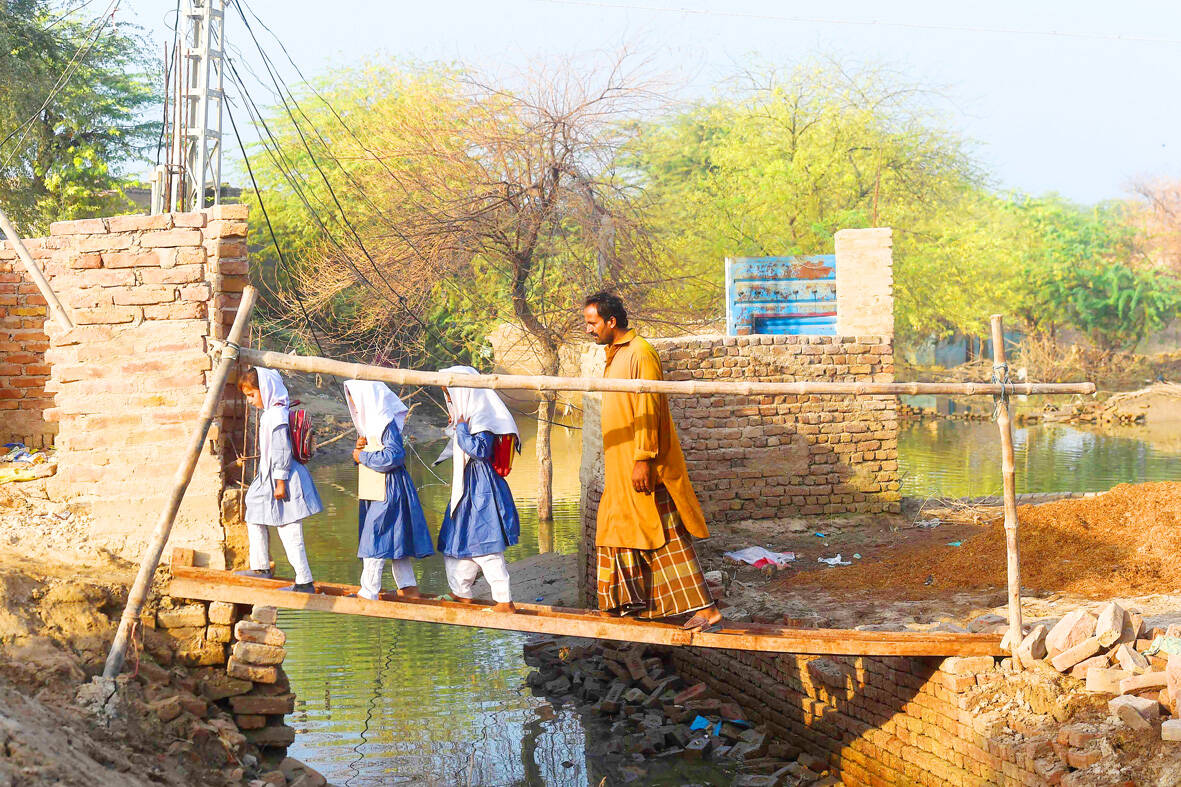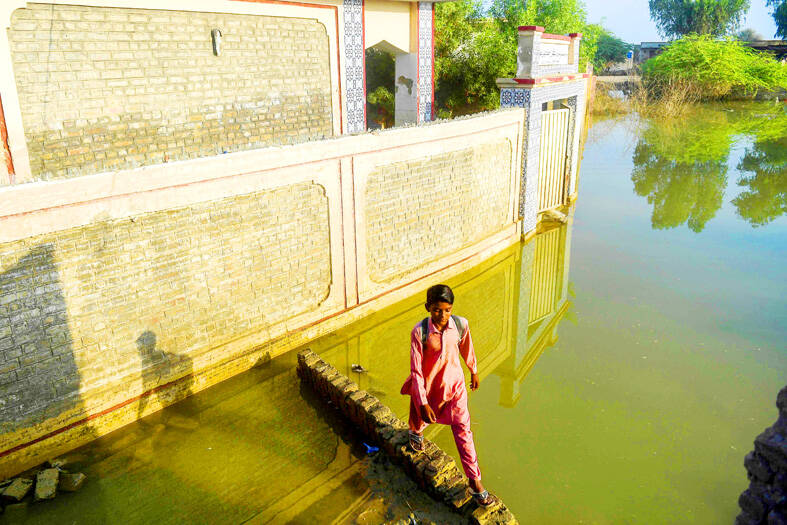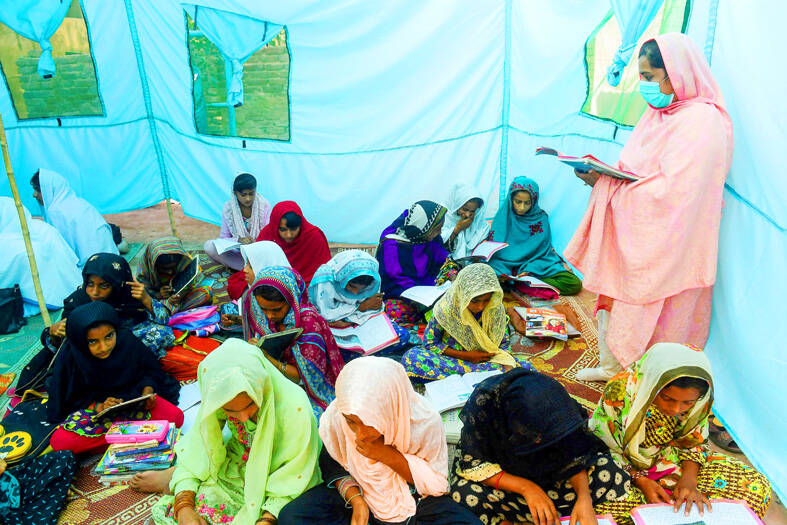Pakistani three-year-old Afshan’s trip to school is a high-wire balancing act, as she teeters across a metal girder spanning a trench of putrid floodwater, eyes fixed ahead.
After record monsoon rain flooded her classroom in the southeastern town of Chandan Mori, this is the route Afshan and her siblings traverse to a tent where her lessons take place.
“It’s a risky business to send children to school crossing that bridge,” Afshan’s father, Abdul Qadir, 23, said. “But we are compelled ... to secure their future, and our own.”

Photo: AFP
In Pakistan, where one-third of the country lives in hardship on less than US$4 a day, education is a rare ticket out of grinding poverty.
This summer, floods destroyed or damaged 27,000 schools and spurred a humanitarian disaster which saw 7,000 more commandeered as aid centers, the UN Children’s Fund said.
The education of 3.5 million children has been disrupted as a result, the charity said.

Photo: AFP
“Everything has gone away, we lost our studies,” said 10-year-old Kamran Babbar, who lives in a nearby tent city since his home and school were submerged.
Before the rains, which have been linked to climate change, Afshan followed her sisters to a lime green schoolhouse.
About two-and-a-half months after they finally abated, her school remains swamped by standing water.

Photo: AFP
More than 300 boys and girls have decamped to three tents where they sit on floors lined with plastic sheeting, answering teachers’ questions in chorus.
As midday approaches the tents are baked by the sun, and students fan themselves with notebooks — quenching their thirst with mouthfuls of cloudy, polluted floodwater.
Many cannot summon the strength to stand when called to answer questions by teacher Noor Ahmed.
“When they fall sick, and the majority of them do, it drastically affects attendance,” he said.
In this conservative corner of Pakistan, many girls are already held back from school, groomed for lives of domestic labor.
Those students that were enrolled had their prospects dampened by hunger and malnutrition even before the monsoon washed away vast tracts of crops.
Over the past two years, the COVID-19 pandemic saw schools shut for 16 months.
The floods — which put one-third of Pakistan underwater and displaced 8 million — are yet one more hurdle many would not overcome.
“We are nurturing an ailing generation,” Ahmed said.
In the nearby town of Mounder, the monsoon storms tore the roof off the government school.
The walls are cracked and crumbling, and students now congregate outside, fearful of a collapse.
The boys learn under the shade of a tree in the courtyard, while the girls gather nearby in a donated tent.
“Such events will leave an everlasting traumatic impact on the girls,” teacher Rabia Iqbal said.
“If we want to make them mentally healthy, we will have to immediately move them from tents to proper classrooms,” she added.
The return to school is unlikely to be swift.
Analysis suggests the bill for the reconstruction of schools and recovery of the education system would be nearly US$1 billion — the total repair bill is close to US$40 billion — in a nation already mired in economic turmoil.
Undaunted by the difficulties ahead, the girls of Chandan Mori’s high school trudge every day to a temporary classroom 3km away.
“We will not be defeated by such circumstances,” 13-year-old Shaista Panwar said.

‘IN A DIFFERENT PLACE’: The envoy first visited Shanghai, where he attended a Chinese basketball playoff match, and is to meet top officials in Beijing tomorrow US Secretary of State Antony Blinken yesterday arrived in China on his second visit in a year as the US ramps up pressure on its rival over its support for Russia while also seeking to manage tensions with Beijing. The US diplomat tomorrow is to meet China’s top brass in Beijing, where he is also expected to plead for restraint as Taiwan inaugurates president-elect William Lai (賴清德), and to raise US concerns on Chinese trade practices. However, Blinken is also seeking to stabilize ties, with tensions between the world’s two largest economies easing since his previous visit in June last year. At the
Nearly half of China’s major cities are suffering “moderate to severe” levels of subsidence, putting millions of people at risk of flooding, especially as sea levels rise, according to a study of nationwide satellite data released yesterday. The authors of the paper, published by the journal Science, found that 45 percent of China’s urban land was sinking faster than 3mm per year, with 16 percent at more than 10mm per year, driven not only by declining water tables, but also the sheer weight of the built environment. With China’s urban population already in excess of 900 million people, “even a small portion

UNSETTLING IMAGES: The scene took place in front of TV crews covering the Trump trial, with a CNN anchor calling it an ‘emotional and unbelievably disturbing moment’ A man who doused himself in an accelerant and set himself on fire outside the courthouse where former US president Donald Trump is on trial has died, police said yesterday. The New York City Police Department (NYPD) said the man was declared dead by staff at an area hospital. The man was in Collect Pond Park at about 1:30pm on Friday when he took out pamphlets espousing conspiracy theories, tossed them around, then doused himself in an accelerant and set himself on fire, officials and witnesses said. A large number of police officers were nearby when it happened. Some officers and bystanders rushed

Beijing is continuing to commit genocide and crimes against humanity against Uyghurs and other Muslim minorities in its western Xinjiang province, U.S. Secretary of State Antony Blinken said in a report published on Monday, ahead of his planned visit to China this week. The State Department’s annual human rights report, which documents abuses recorded all over the world during the previous calendar year, repeated language from previous years on the treatment of Muslims in Xinjiang, but the publication raises the issue ahead of delicate talks, including on the war in Ukraine and global trade, between the top U.S. diplomat and Chinese